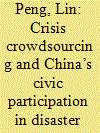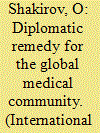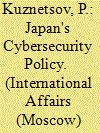| Srl | Item |
| 1 |
ID:
156521


|
|
|
|
|
| Summary/Abstract |
The devastating 2008 Wenchuan earthquake unfolded the co-evolution of a proactive civic engagement and extensive application of web-based information and communication technologies (ICTs) in China’s disaster response. However, existing literature has not yet sufficiently examined how ad hoc web-based voluntary participation has led to long-term development of digital disaster management in China in the wake of the Wenchuan earthquake of 2008. The present article addresses this gap by focusing on one specific type of ICT-mediated civic effort, crisis crowdsourcing, and presenting newly collected empirical evidence from relief work in the 2008 Wenchuan, 2010 Yushu, and 2013 Lushan earthquakes. This article examines the emergence of a broad-based digitally enabled civic participation in disaster response and its more general political implications. The main findings of this study suggest that web-based ICTs have not only enabled the relatively weak and episodic social actors to overcome constraints on information, fundraising, organizational development and to achieve collective development in a field historically dominated by the state, but also facilitated the evolution of a parallel disaster management system with agenda, skills and expertise independent of the state.
|
|
|
|
|
|
|
|
|
|
|
|
|
|
|
|
| 2 |
ID:
189164


|
|
|
|
|
| Summary/Abstract |
IN MARCH 2021, most UN member states recognized the special importance of protecting health care infrastructure from cyber threats. A point to that effect was included in the final report1 of the Open-ended Working Group (OEWG) on developments in the field of information and telecommunications in the context of international security, a negotiation format launched in 2018 on Russia's initiative. The report reflects progress achieved at the UN and in other formats during more than two decades of debate on cybersecurity and information security in general,2 but it was the first UN document to include a separate section on the health care aspect of international information security. The fact that the report was passed by a consensus vote is an indication of the importance of this issue.
|
|
|
|
|
|
|
|
|
|
|
|
|
|
|
|
| 3 |
ID:
192460


|
|
|
|
|
| Summary/Abstract |
CYBERSECURITY1 as a component of information security and, more broadly, an element of the safe use of Information and Communication Technologies (ICTs) is an area where Japan has not made as much progress as one would have expected from such a technologically advanced country. For comparison, while Russia adopted its first information security doctrine in 2000 [3], Japan during that time dealt with information security and cybersecurity in separate documents that did not directly comprise a single strategic system. Those documents were the Basic Act on the Formation of an Advanced Information and Telecommunications Network Society [4], the e-Japan Strategy [5], and the e-Japan Strategy II [6].
|
|
|
|
|
|
|
|
|
|
|
|
|
|
|
|
| 4 |
ID:
180705


|
|
|
|
|
| Summary/Abstract |
ON DECEMBER 28, 2019, the Russian president established a new division in the Foreign Ministry, the Department of International Information Security (DMIB). This showed special attention paid by the Russian leadership to the whole spectrum of issues brought into being by information and communication technologies (ICTs) and aimed to ensure prompt and effective diplomatic reactions to challenges and threats arising in information space.
|
|
|
|
|
|
|
|
|
|
|
|
|
|
|
|
| 5 |
ID:
173273


|
|
|
|
|
| Summary/Abstract |
RUSSIA is a signatory to many multilateral cooperation agreements on international information security. They include the Agreement among the Governments of the Member States of the Shanghai Cooperation Organization on Cooperation in the Field of International Information Security signed on June 16, 2009,1 the Agreement among Member States of the Commonwealth of Independent States on Cooperation in the Field of Information Security, November 20, 2013,2 and the Agreement on Cooperation among Member States of the Collective Security Treaty Organization in the Field of Information Security, November 30, 2017.
|
|
|
|
|
|
|
|
|
|
|
|
|
|
|
|